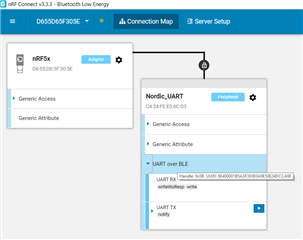I am using an nRF52840 Dongle to try and connect to a product over Bluetooth and communicate with it. I have been able to open this dongle using nRF Connect Bluetooth Low Energy, and can successfully find my product, connect to it, and write to its characteristics. I am now needing to use a C program to do this same thing.
I have downloaded the pc-ble-driver, created a project in my C IDE, and copied the code from the heart rate collector example to be the project's source file. I got the project to build without issue, and following the instructions in the examples github page, have flashed the dongle with the correct firmware to allow the c program to connect to it. I am able to successfully connect to the dongle's COM port and scan for devices.
I did have to make some modifications to the source file. My product I want to connect to doesn't advertise its name, so I was unable to connect to it even when finding it. This product does, however, advertise the Manufacturer Specific Data field, and after some trial and error, I was able to modify the find_adv_name routine to instead check for Manufacturer Specific Data, and I was able to connect to the device this way.
After this, I get output strings that read: "Connection Established", "Discovering Primary Services", and "Received Service Discovery Response". However, I then get an error message saying "Service Discovery Failed. Error Code 0x10A". Stepping through the code, this error is getting set after the "on_connected" routine is finished, but before starting the on_service_discovery_response routine.
I have changed the value of BLE_UUID_HEART_RATE_SERVICE to match the UUID of my product's service, but there was no effect. I had also been told in the past to try changing the srvc_uuid.type from BLE_UUID_TYPE_BLE to BLE_UUID_TYPE_VENDOR_BEGIN, but when doing this, I get a failure returned from the function "sd_ble_gattc_primary_services_discover", with the error code 0x8005, which seemingly corresponds to NRF_ERROR_SD_RPC_NO_RESPONSE.
Could anyone give me any pointers for where to look for what all to change in the source code in order to connect to my product rather than whatever heart rate monitor it is expecting? Thanks!



